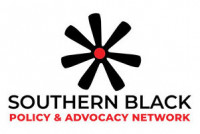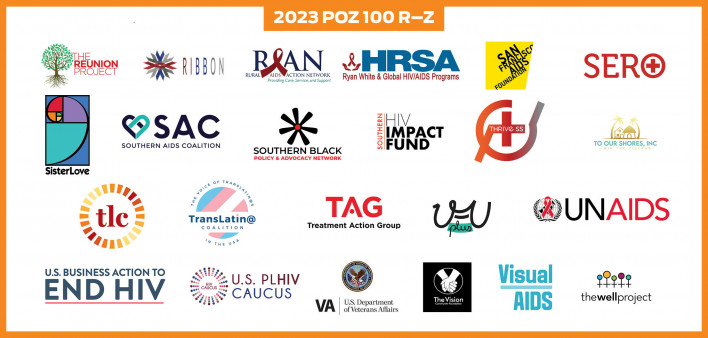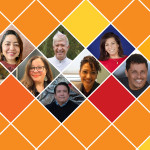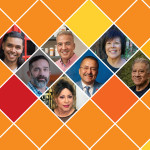Introduction | A-B | C-F | G-M | N-Q | R-Z
The Reunion Project

There are many ways to define a long-term survivor of HIV; The Reunion Project (TRP) includes them all. Founded in 2015, this grassroots network of long-term survivors collaborates with local and national advocates, providers and researchers and creates safe spaces for survivors of HIV to come together. The group convenes and connects individuals to share their experiences of survival and loss, to honor their past, to develop successful strategies for living with HIV and to support one another. Each year, TRP hosts several town halls (virtual and in-person) to honor the unique lives of long-term survivors. These summits feature a mix of facilitated discussions, expert panels and presentations by key researchers, advocates and long-term survivors. The most recent TRP town hall was held in Charlotte, North Carolina.
Ribbon

Ribbon Consulting Group, LLC is a full-service consulting practice led, owned and operated by two women of color living with HIV. The business was formed to provide practical solutions for organizations serving people living with HIV and other chronic health conditions. Ribbon provides strategic planning, initiative-crafting, community mobilization, technical assistance and more to AIDS services organizations, health service providers and individuals. It also helps its clients develop and provide culturally responsive education and services. Its Ribbon Organizing Center for HIV and Aging program aims to improve the health and quality of life of people aging with HIV by developing and offering education, training and resources to 23 national, regional and local organizations as part of Gilead Sciences’ HIV Age Positively Initiative.
Rural AIDS Action Network

The Rural AIDS Action Network (RAAN) formed 25 years ago to address the lack of services available to people living with HIV and AIDS outside Minnesota’s Twin Cities metro area. Today, the organization leads the fight to stop HIV in the state’s rural areas through a broad array of client services, including HIV and hepatitis C testing, medical case management, nutrition and transportation support, syringe exchanges and support groups. Spread over five locations, its staff serves clients in 80 counties. Ten years ago, RAAN began its syringe service program; in 2022, the program distributed 521,000 syringes and collected 347,000. RAAN also offers free Narcan (naloxone) to reverse opioid overdoses.
Ryan White HIV/AIDS Program

Named for the 1980s Indiana activist who died of AIDS-related complications as a teenager in 1990, the Ryan White HIV/AIDS Program is a federal program that helps low-income Americans living with HIV receive free medical care, medications (through ADAP) and essential support services, such as transportation, food and rental assistance. More than half of Americans diagnosed with HIV—about 500,000 people—receive Ryan White program services each year. The program also helps diagnose, treat, prevent and respond to the national HIV epidemic by providing grants to cities, states, counties and community-based groups to help provide care, medication and essential services; improve HIV-related health outcomes; and reduce HIV transmission.
San Francisco AIDS Foundation

Founded in 1982, the San Francisco AIDS Foundation (SFAF) currently provides direct services to more than 21,000 people in the San Francisco Bay Area. SFAF envisions a future in which health justice prevails for all people living with or at risk for HIV. The nonprofit offers sexual health counseling and testing, PrEP and PEP, HIV support, substance use treatment, case management, syringe access, overdose prevention, housing, financial benefits and more. SFAF serves various communities, including people living with HIV, queer and trans people of color, trans and nonbinary people, people over age 50 and people who inject drugs. More than 90% of its clients ages 50 and older are engaged in medical care with viral suppression, and more than half of the people accessing PrEP for HIV prevention at SFAF are BIPOC (Black, Indigenous and people of color).
Sero Project

POZ founder Sean Strub founded the Sero Project to end unjust criminal prosecutions of people living with HIV. Since its inception, the nonprofit has centered and empowered the voices of people living with HIV in its decriminalization efforts. The Sero Project raises awareness through community outreach, education and grassroots mobilization. It produces the biennial HIV Is Not a Crime conference, which trains advocates and provides them with the necessary tools to fight HIV crime laws in their states. Since 2012, the Sero Project has helped modernize and update laws in 14 states, including Iowa, Colorado, Georgia and Nevada. The Sero Project is also one of the founders of HIV Justice Worldwide, a global HIV criminalization resource and advocacy hub.
SisterLove, Inc.

Founded in 1989, SisterLove, Inc. began as a volunteer group in Atlanta focused on raising awareness about HIV prevention and safer-sex practices, specifically for women of color. It has since expanded to become a prominent and influential advocacy organization for sexual and reproductive health rights. One of SisterLove’s main initiatives is the Healthy Love Experience, which offers empowerment groups for women, HIV prevention education, HIV testing and counseling, community outreach and assistance with case management. Using community-based research, SisterLove works to better understand barriers to sexual and reproductive justice and identify sustainable solutions for achieving health equity. Each year, new members are inducted into SisterLove’s Leading Women’s Society, which consists of outstanding women who have lived with HIV for 20 years or more while serving as advocates in their communities.
Southern AIDS Coalition

Founded in 2001, when HIV in the South was being largely ignored, the Southern AIDS Coalition was born when a handful of advocates demanded more resources to address the growing HIV epidemic in the region. In 2006, the group scored a big win with the modification of the distribution formula in the reauthorization of the Ryan White program, which redirected about $30 million of funding to the South. In 2012, the coalition also played a role in attaining funding from Care and Prevention in the United States that was aimed at reducing HIV and AIDS deaths among U.S. racial minorities. As a Gilead COMPASS Coordinating Center, the group also provides grants, leadership development and trainings for care providers to combat HIV-related stigma.
Southern Black Policy and Advocacy Network

The Southern Black Policy and Advocacy Network (SBPAN) increases the capacity of Black communities and leaders to make meaningful public health policy in the South. With its extensive relationships with groups across the region, the group leverages data, evidence-informed solutions and cultural competency to provide training, education and advocacy and to mobilize. In 2018, SBPAN launched its first initiative, the Southern Black HIV/AIDS Network, to train and mobilize a new generation of Black HIV leaders. It also created “Organizing to End Black HIV NOW,” a digital media campaign to educate and organize Black HIV advocacy groups. Last year, founder and CEO Venton Jones was elected to the Texas House of Representatives, making him the first Black gay state legislator openly living with HIV.
Southern HIV Impact Fund

Created by Funders Concerned About AIDS in 2017 to coordinate and expand philanthropic efforts to end HIV in the South, the Southern HIV Impact Fund is managed by AIDS United and receives support from Gilead Sciences, ViiV Healthcare, the Levi Strauss Foundation and Janssen. The fund provides a combination of cash grants and technical assistance to community-based and social justice groups in nine Southern states. Its efforts aim to address the intersecting barriers that fuel the HIV epidemic in the South, including poverty, inadequate education, persistent HIV stigma, racism, homophobia and transphobia. In its first five years, the Southern HIV Impact Fund invested more than $12 million to support the work of nearly 200 organizations across the South serving the most vulnerable and marginalized communities.
THRIVE SS

The nonprofit Thrive SS provides support for Black same-gender-loving men living with HIV in Atlanta. Since 2015, it has worked to accomplish its mission through direct-support advocacy and community involvement. Thrive SS links people to care, distributes condoms and provides at-home HIV tests. Its clients can also receive support services, such as housing, employment and technical assistance. Thrive SS holds various community events and runs several HIV-related programs, including The Silver Lining Project, a safe space where older Black men living with HIV can share, discuss and advocate for issues impacting them.
To Our Shores

Founded in 2013, To Our Shores is a community-based organization providing primary and HIV medical care to residents living in metro Atlanta, especially in Gwinnett and the surrounding rural counties. It seeks to help eliminate health care disparities by providing culturally informed and individualized medical, social and preventive free and low-cost services as well as educational workshops. To Our Shores understands that certain barriers can prevent individuals from accessing care, so it offers translation services for patients for whom English is a second language and an on-demand car service to and from medical appointments.
Transgender Law Center

Founded in 2002, the Transgender Law Center (TLC) is the largest national trans-led organization in the United States. TLC works to protect and advance the rights of transgender and gender-nonconforming people, who have a higher rate of HIV than the population as a whole. The TLC Legal Information Helpdesk provides basic information on laws and policies that affect transgender people, including laws concerning health care, housing, immigration and identity documents. TLC’s Attorney Solidarity Network provides legal advice or representation to trans people through a network of cooperating attorneys. Other programs include Positively Trans, which advocates for trans women of color living with HIV; Black Trans Circles, which uplifts Black trans women leaders in the South and Midwest; and Gender Justice Leadership Programs, which engages trans and gender-nonconforming young people in storytelling.
TransLatin@ Coalition

In 2009, a group of transgender, gender-nonconforming and intersex (TGI) immigrant women in Los Angeles came together to form the TransLatin@ Coalition to address the needs of TGI Latina immigrants in the United States. Today, it is the largest trans-led organization in Los Angeles providing direct services to the TGI community, and its board is made up of trans Latina leaders from across the country. Services include a drop-in center, legal services, transitional housing, leadership programs, workforce development programs and more. In 2017, it opened the Center for Violence Prevention and Transgender Wellness to raise awareness of the fact that TGI people experience hate and violence at alarming rates and to address the needs of TGI individuals who have been victims of violence. The group was recently awarded $750,000 by the California House of Representatives to support its workforce development efforts.
Treatment Action Group

Treatment Action Group (TAG) was founded in 1992 by members and alums of ACT UP New York who wanted to focus full-time on speeding up AIDS research, advocating for increased funding and ensuring that people living with HIV had access to and information about potentially lifesaving treatments. In its early years, the group pushed to overhaul clinical trials to produce quicker and more reliable answers about new drugs. Group members liaised with government scientists, drug company researchers and Food and Drug Administration officials. In recent years, TAG has pursued advocacy to promote safe and effective diagnostics, prevention tools and cures to help end not just HIV but tuberculosis and hepatitis C with input from the communities most affected.
U=U plus

Launched in 2022, U=U plus is a U.S.-based organization born out of the Prevention Access Campaign’s “Undetectable = Untransmittable” (U=U) campaign, which shares the message that people on effective treatment with an undetectable viral load cannot transmit HIV sexually. The mission of U=U plus is to implement an equitable HIV response through empowerment, engagement and education. The organization works to uplift people living with HIV while also promoting collaboration and community participation. In addition, U=U plus provides education, training, capacity building and technical assistance to U=U. While it’s understood that not everyone may be able to have an undetectable viral load, the message of U=U can enrich the lives of all people living with HIV by helping to reduce HIV-related stigma.
UNAIDS

Founded in 1996, UNAIDS, an entity of the United Nations, leads the global effort to end the HIV epidemic by 2030. The group places people living with HIV at the center of designing, delivering and monitoring the AIDS response and helps chart paths for countries and communities to get on the fast track to ending AIDS. With offices in 70 countries, UNAIDS has the world’s most extensive data on HIV epidemiology, program coverage and finance and publishes the most authoritative and up-to-date information on the HIV epidemic. UNAIDS helps shape public policies on HIV and scale up the world’s response to the virus.
U.S. Business Action to End HIV

U.S. Business Action to End HIV is a growing coalition of businesses committed to ending HIV by 2030. Initiated by the drugmaker ViiV Healthcare, the coalition was founded in 2022 by Health Action Alliance, a partnership of business, communications and public health organizations. U.S. Business Action to End HIV offers free tools and resources and organizes events to help employers educate workers, fight stigma and improve access to HIV prevention and treatment services. It also encourages businesses to advocate for policies that promote better access to HIV services and strengthen public funding. Companies can also commit to supporting local communities most affected by HIV or to provide funding to help grow the coalition’s response and operations. Such companies as Walmart, Paramount Pictures and Uber have already joined the coalition and committed to doing their part to end HIV.
U.S. PLHIV Caucus

Founded in 2010, the U.S. PLHIV Caucus is committed to achieving a world where all people living with HIV (PLHIV) have what they need to live and thrive. Its membership is made up of both individuals living with the virus as well as PLHIV-led groups and networks. The organization’s work is rooted in the Meaningful Involvement of People with HIV (MIPA), which means that those who are most affected are truly a part of discussions and decisions regarding the response to HIV. The caucus co-organizes the annual HIV advocacy event AIDSWatch and is a partner in the annual U.S. Conference on HIV/AIDS. It advocates for the rights and dignity of PLHIV and provides leadership development and technical assistance to support PLHIV as well as organizations that embrace the principles of MIPA.
Veterans Affairs

The Department of Veterans Affairs (VA) is the largest single provider of medical care to people with HIV in the United States. In 2019, there were over 31,000 veterans with HIV in care. The VA also leads the country in HIV screening, testing, treatment, research and prevention. The VA’s HIV efforts are coordinated by the HIV, Hepatitis, and Related Conditions Programs. It developed the HIV Prevention and Care Affinity Group Program to support facilities and groups focused on HIV testing, HIV care leading to viral suppression, increasing PrEP uptake, developing syringe service programs and improving STI screenings. The VA website features fact sheets on HIV-related topics for veterans (and the general public) along with links to additional resources.
The Vision Community Foundation

The Vision Community Foundation offers programs and services as well as free HIV testing to underserved families and individuals in the Atlanta area. The nonprofit also provides HIV prevention training through its Prevention from the Pulpit Initiative, which works to harness the influence of faith leaders to raise awareness about HIV and other health issues affecting the Black community. The initiative has trained more than 1,000 faith leaders on HIV prevention, treatment and care and holds eight regional summits each year. It has built a strong relationship with the Pride community and partners with the annual Pure Heat Community Festival to share messages of HIV prevention and empowerment.
Visual AIDS

Founded in 1988, Visual AIDS is the only contemporary arts organization dedicated to raising HIV awareness and fostering dialogue around timely issues relating to HIV through visual art projects (including the iconic red ribbon, created in 1991 by the Visual AIDS Artists’ Caucus), exhibitions, public forums and publications. The online Visual AIDS Artist Registry is the largest database of works by artists with HIV and AIDS and helps artists reach new audiences while also inspiring and educating the public. The organization also hosts art therapy workshops for women that use artmaking to reduce stigma, build community and empower women living with HIV. Among its new projects are the Visual AIDS Research Fellowship, which supports research on artists lost to AIDS, and The Body as an Archive, an oral history project that records conversations between artists living with HIV.
The Well Project

Since it was founded in 2002, The Well Project has provided education, support and resources for women and girls across the gender spectrum living with and affected by HIV to help them survive and thrive with HIV. Most important, the organization teaches women how to advocate for their health and general well-being as well as how to live free of stigma. The Well Project leverages technology—via its web portal, social media and more—to improve the quality of life for women living with HIV. Its programming is divided into five categories: education and information, community support, advocacy and leadership, collaborative engagement and women-focused research. Its motto is: “Together, we can change the course of the HIV epidemic...one woman at a time.”
Introduction | A-B | C-F | G-M | N-Q | R-Z







Comments
Comments